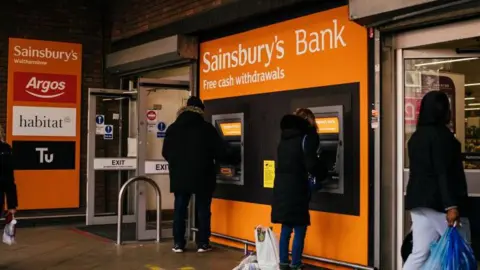By Tom Espiner, BBC business reporter
 Getty Images
Getty ImagesNatWest is to buy the main banking business of Sainsbury’s as the supermarket chain withdraws from the sector in order to focus on food.
Under the deal, NatWest will take on the credit cards, loans and savings accounts of Sainsbury’s Bank.
However, it is not buying the Sainsbury’s Bank brand, or its cash machines, insurance or travel money businesses.
Customers will see no immediate change as a result of the deal, Sainsbury’s said, and “do not need to take any action”.
Sainsbury’s said it would seek to redeploy employees at risk of losing their jobs as part of a consultation process.
Although NatWest is not automatically taking on those Sainsbury’s employees as part of the deal, a spokeswoman for the supermarket said “both parties are committed to exploring opportunities for ongoing employment with NatWest”.
She declined to say how many employees would be affected.
NatWest said it would gain about one million customer accounts as part of the deal, which is expected to complete at the end of March next year.
The bank will take on £1.4bn of unsecured personal loans and £1.1bn of credit card balances, as well as £2.6bn of customer deposits.
Sainsbury’s Bank will pay out £125m to NatWest and £250m to Sainsbury’s as part of the agreement.
Sainsbury’s Bank started as a joint venture with the Bank of Scotland in 1997, before Sainsbury’s took full ownership in 2014
But the supermarket said in January that it planned to wind down its banking division in order to focus on its core food business.
Sainsbury’s is not the only supermarket to have pulled out of the banking sector.
In February, Tesco sold its retail banking operations to Barclays in a deal worth £600m.
Barclays bought Tesco Bank’s credit cards, loans and savings accounts and also agreed to market Tesco-branded banking services.
